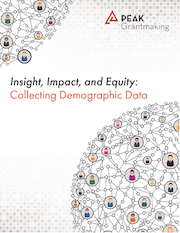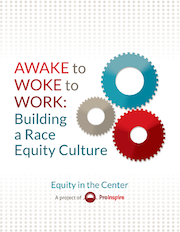Racial Equity
 Racial Equity Tools is designed to support individuals and groups working to achieve racial equity. This site offers tools, research, tips, curricula and ideas for people who want to increase their own understanding and to help those working toward justice at every level.
Racial Equity Tools is designed to support individuals and groups working to achieve racial equity. This site offers tools, research, tips, curricula and ideas for people who want to increase their own understanding and to help those working toward justice at every level.
Foundation funding in support of global human rights initiatives totaled $2.8 billion in 2016, up from $2.4 billion in 2015, according to the report from Candid and the Human Rights Funders Network.
Guide your philanthropy clients through the complexities of their work in diversity, equity and inclusion (DEI) with our DEI Toolkit for Consultants to Grantmakers.
Frontline Solutions released the Equity Footprint, a toolkit to help philanthropy assess the impact of a philanthropic organization on communities. The Equity Footprint framework report includes guiding questions in seven different domains to help leaders begin to assess their foundation’s footprint.

There is great interest among grantmakers in demographic data, but no consensus or shared purpose yet on what data should be collected and how it should be used. This preliminary research on demographic data collection serves to create a baseline understanding of where the field is in demographic data collection that covers both the process of data collection and current use of demographic data.

Achieving race equity — the condition where one’s racial identity has no influence on how one fares in society — is a fundamental element of social change across every issue area in the social sector. In a sector focused on improving social outcomes across a wide range of issues, we need only look within our own organizations to understand why we have not yet achieved the depth of change we seek.
Evaluators, foundations and nonprofits need to examine the “fit” of our existing evaluation approaches with the principles and values that underlie grantmaking and efforts designed to advance equity.
The Dodge Foundation’s latest cycle of grants provides support to over 30 organizations focused on addressing the root cause and repair of structural racism and inequity across New Jersey.
The Dodge Foundation made more than $5 million in grants which served to acknowledge long-standing partners and collaborators, support new partners who are driving racial equity and justice, and respond to the real-time issues and crises facing people across the State of New Jersey.
The FirstEnergy Foundation awarded more than $3.43 million to nearly 100 organizations across its six-state service territory for the final round of "Investing with Purpose," an initiative focused on supporting nonprofit organizations that advance health and safety, workforce development, educational and social justice initiatives.
